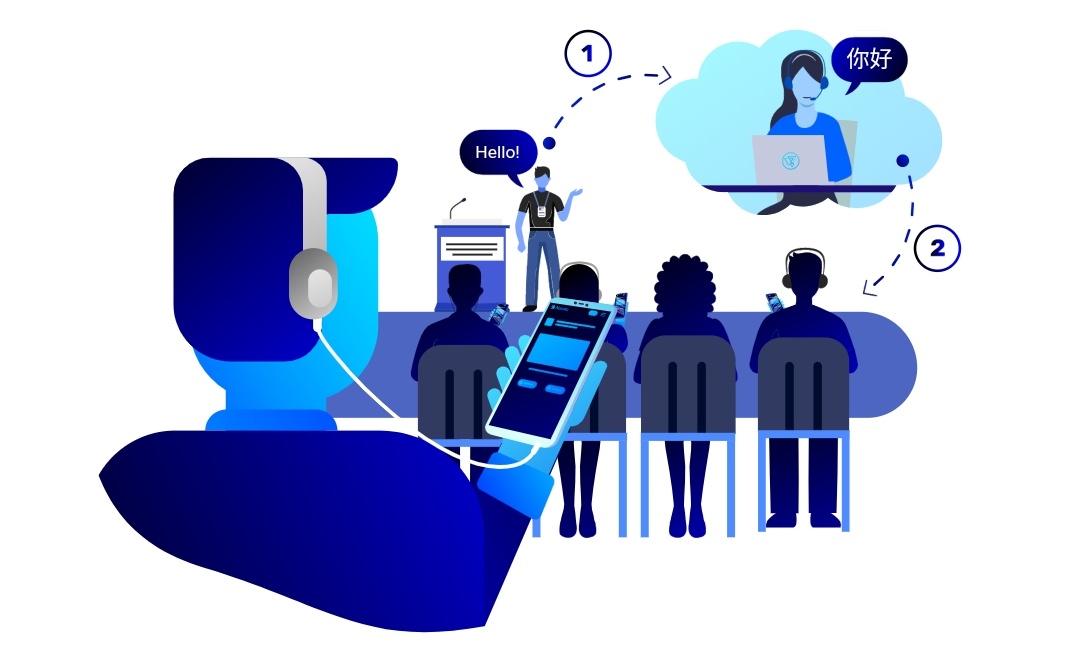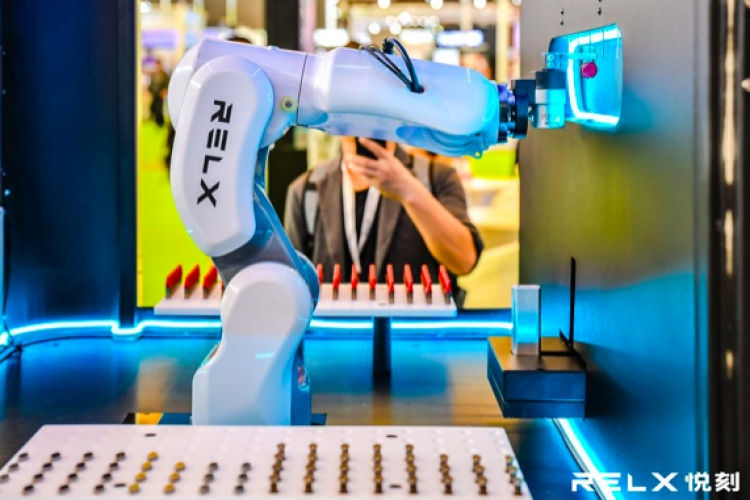Startup Watch: Akkadu Brings Live Event Interpreting Into the Smartphone Era
Startup Watch highlights up-and-coming innovators who are trying to make it big in Beijing's thriving startup world.
Who: Akkadu
What: A live event interpreting platform
When: Founded in 2018
Where: Beijing-based, expanding globally
As a young man growing up in Barcelona, Alvaro (AKA 梦龙 Mèng Lóng, pictured below) did not know what step to take next with his life, but he knew that it would involve entrepreneurship – all he needed was someone to point him in the right direction.
That someone came while he was working as a security guard at a convention center in Barcelona. Spotting a man eating leftovers out of the open door of a Mercedes Benz in the parking lot, Alvaro thought to himself, "He can afford the car, but can’t afford to eat out?" It didn’t add up. As it turned out, the man was not the owner of the car, but a chauffeur who drove businesspeople to the convention center.
By swapping his security tag for a chauffeur's cap, Alvaro was then able to pick the brains of the city's business elite, including Huawei CEO Ren Zhengfei, who told him to look to China for opportunities: "That is where everything is happening," Ren said. This was the push Alvaro was waiting for. He enrolled at Tsinghua University, and went on to found his first startup, Akkadu, right there on campus.

What is Akkadu?
When you think of live interpretation, perhaps you imagine diplomats at the UN, each with a headset transmitting the voice of interpreters from behind a glass partition. In contrast, Akkadu wants to make live interpreting available to the masses. Attendees at an event serviced by Akkadu scan a QR code that takes them directly to a live audio stream of the event. They choose their preferred language from the options the event organizer has chosen to provide, plug in their headphones, and listen to an interpreter, who may be in a completely different part of the world.

Alvaro named his company after the mythical language spoken by the Babelites before they built the tower that sent the world into communicative confusion. Now, he oversees a small team at Beijing’s Innoway start-up incubation street, where we sat down with him for a conversation about how he came up with the idea for Akkadu, its mission, and the challenges it has faced along the way.
Do you have a story that you like to tell about your company?
We created Akkadu because we strongly believe that everyone has the right to learn, no matter the language they speak. That’s why we feel so excited any time there is an event, conference, workshop, lecture, and they rely on us to help more people to learn from the content.
Does that come from a personal place?
Akkadu started in Tsinghua University, where I was doing my MBA. There were so many good Chinese professors who only gave lectures for the Chinese MBA, not for the international MBA. Many Chinese students in the International MBA program even went to those classes, because they said “this professor is amazing, Alvaro. He speaks so well, and tells these great personal stories.” It seemed unfair that other international students, couldn't take part too.
Then, there was a competition at Tsinghua sponsored by Facebook where they asked us to come up with an idea, work on that for three months based on the theory they were teaching us, and then there was a start-up competition with investors. Even Zuckerberg came for the classes. But the second speaker was always speaking Chinese. So they always had to leave halfway through the class because I didn’t understand.
So I thought, everyone talks about voice recognition translation, I figured I would try a prototype to try to help this course. I didn’t build it on time, but I built it in time for the final, where I started speaking Spanish, and the prototype generated Chinese subtitles. That’s when I got the second prize and won the investment. Later, I decided to focus on interpretation.
The dean of the Economics Department of Tsinghua came to me after I received the prize, and said, “Alvaro, we have some great teachers, but when they speak English it sounds bad. Your solution can help all of us at the University.” That’s when I knew I was really into something. In the beginning, Akkadu was about education, but in the end, there was more of a need for events and conferences, although now we are going back to the schools, too.
Actually, our event at Tsinghua was how we hired [our business developer] Yasser. He was listening to the event from home, in English. He thought the talks were so interesting that he decided to come in person, and he was surprised to find that it was in Chinese because he was so used to listening in English. Then he came to talk to me and joined our team that day.
What makes your company different from similar cloud-based interpretation companies?
When we first started doing this, we didn’t know of any other companies doing this – we just jumped right in. I think one of the differences is the visibility that we give to the interpreters. All of our interpreters are in different countries, and we don’t want to be the middleman. We want the event organizers to be able to have direct access to our interpreters to measure their quality before booking them. Some traditional companies receive the money and then decide for the organizer. The other thing that sets us apart is our pricing structure. We want the interpreters to know how much we are making and how much we are giving to them.
You have translators working from all over the world. Does that cause issues with lag?
We started with servers in the US but soon migrated them to China. This has its advantages because now we have more local interpreters doing Chinese to English, Chinese to German, etc. than other platforms.
Yes, there is a lag in the connection but we are working on that. We built a streaming service by ourselves, but now we are starting to explore partnerships with other tech companies to build a new streaming solution. One of our partners has almost 200 servers around the world, but now we are at the point where we can afford to pay this cost because we have got the investment.
Just last week, we did a 30-minute stream from Beijing to Spain, and the lag was 0.5 seconds, and there were no cuts. So we are excited for the near future, as we should soon shift from our current streaming to the partner streaming. Then we will be ready to serve our solution globally.
Our focus is on China, but we have also done streams overseas thanks of the resources that we have: our Chinese interpreters. We have also had to cancel events though. For example, it was difficult to get a good connection in Israel. We have also worked in the US, Tokyo, Singapore, Spain, but we were slightly hesitant to take those projects. With our new partners, though, things should go much more smoothly.
Are there any other partnerships, outside of streaming, that you take advantage of?
I spoke with TechNode recently because if you listen to their events, they are all bilingual. Even when the event finishes, you can scan the QR code and listen to the event in English and in Chinese. Because content doesn’t expire, if something is interesting, it’s interesting now and will continue to be interesting week and next month.
READ: A Curated Guide to Beijing’s Startup Scene
Your business model is fundamentally multilingual. Is your work environment also multilingual?
When we speak with the team, it’s mainly in English although we all speak at least some Chinese. But on the client’s side, communication is mainly in Chinese.
What are the strengths of your current team?
There are both strengths and weaknesses. There is only one Chinese developer versus three foreigners, so the advantage is that when we need to implement technologies, we have this pool of global research, but sometimes it can be difficult to go deep into the Chinese market. However, our Chinese colleague does help with some of that.
For recruiting, we also require our developers to know English, but unfortunately, few developers are fluent in English. That is a challenge.
I gave you some questions in advance of this interview, and earlier you mentioned that each answer was written by a different member of the team. It seems you have a very share-the-load kind of mentality.
We grow together, learn together, and fail together. We share everything and we inspire each other.

What is your approach to growth?
Everyone is doing marketing right now. For example, every Monday, we allocate who will do a LinkedIn post, and if there is an event, then from the business side we will do a WeChat post.
Have you found that approach to be effective so far?
Our marketing goal right now is to bring traffic to our website. Last month we had 1,000 unique visitors to our website, which is okay, and we know where they are coming from – some of them are coming from Baidu, Google, from LinkedIn, and some from WeChat as well.
Then, we need to analyze what they're doing on our website because even if 10 percent of users open an account, they also need to be creating events. If not, in 10 months, we are going to die. We’re getting revenue, but not enough to break even, so we have to analyze what is the best strategy, and which platforms we should focus on.
That’s how a start-up works. You analyze quickly, and then you try to fix the problems. You do that again and again until you die or you succeed.
Can you talk about Akkadu’s role in reducing emissions?
The traditional interpreting solution is to have a booth for the interpreters and to give devices to everyone in the audience. All of these devices have batteries, but there is no need for us to provide the same because users listen on their smartphones. All of this equipment usually needs to be shipped to this one place, but with Akkudu there is no need. So we are saving so much battery power, emissions from transit, etc.
Are there any other challenges you have come across so far?
We are a young team, just eight people, and I think a few clients have rejected us due to being afraid that our solution is not stable. For others, it’s because our innovation scares them. They have been using the traditional solution for decades. How do we change that? Sometimes, our contacts are convinced, because they have come to our events, but they cannot convince their boss.
So right now, we are focusing on the early adopters – people who are using it just because it’s something new. But some people will not use it until they see everyone else using it.
Fortunately, we have many examples under our belt, whether they are corporate like Volkswagen, Audi, Google, or government organizations, like the German Chamber, or Israel Chamber. So now we have many examples to show people that this is not completely new. It has been used already, and it’s stable.
Browse Akkadu's functions and pricing via their website akkadu.cn.
READ: "I Don't Let My Fear Slow Me Down": Meet the French Cyclist Who Rode More Than 7,000km to Beijing
More articles by this author here.
Do you know of an up-and-coming startup that we should feature? Contact the author at joeyknotts@thebeijinger.com.
Images courtesy of Akkadu







